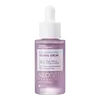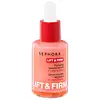What's inside
What's inside
 Key Ingredients
Key Ingredients

 Benefits
Benefits

 Concerns
Concerns

No concerns
 Ingredients Side-by-side
Ingredients Side-by-side

Water
Skin ConditioningButylene Glycol
HumectantRubus Fruticosus Fruit Extract
AstringentGlycerin
Humectant1,2-Hexanediol
Skin ConditioningNiacinamide
SmoothingGlycereth-26
HumectantDiglycerin
HumectantCaprylic/Capric Triglyceride
MaskingAcrylates/C10-30 Alkyl Acrylate Crosspolymer
Emulsion StabilisingTromethamine
BufferingGlyceryl Acrylate/Acrylic Acid Copolymer
HumectantPvm/Ma Copolymer
Emulsion StabilisingEthylhexylglycerin
Skin ConditioningXanthan Gum
EmulsifyingAdenosine
Skin ConditioningPolyglycerin-3
HumectantGardenia Florida Fruit Extract
Skin ConditioningMelaleuca Alternifolia Leaf Oil
AntioxidantPelargonium Graveolens Flower Oil
MaskingSalvia Sclarea Oil
MaskingBakuchiol
AntimicrobialAloe Barbadensis Leaf Extract
EmollientSqualane
EmollientSodium Hyaluronate
HumectantDipropylene Glycol
HumectantDextrin
AbsorbentCyanocobalamin
Skin ConditioningOlea Europaea Fruit Oil
MaskingSolanum Melongena Fruit Extract
Skin ConditioningGuaiazulene
AntimicrobialLavandula Angustifolia Oil
MaskingSodium Ascorbyl Phosphate
AntioxidantAscorbic Acid
AntioxidantTocopheryl Acetate
AntioxidantHydrolyzed Lupine Protein
Skin ConditioningHelianthus Annuus Seed Oil
EmollientLupinus Albus Seed Extract
Skin ConditioningPalmitoyl Tripeptide-5
Skin ConditioningCaprylyl Glycol
EmollientTocopherol
AntioxidantAcetyl Hexapeptide-8
HumectantWater, Butylene Glycol, Rubus Fruticosus Fruit Extract, Glycerin, 1,2-Hexanediol, Niacinamide, Glycereth-26, Diglycerin, Caprylic/Capric Triglyceride, Acrylates/C10-30 Alkyl Acrylate Crosspolymer, Tromethamine, Glyceryl Acrylate/Acrylic Acid Copolymer, Pvm/Ma Copolymer, Ethylhexylglycerin, Xanthan Gum, Adenosine, Polyglycerin-3, Gardenia Florida Fruit Extract, Melaleuca Alternifolia Leaf Oil, Pelargonium Graveolens Flower Oil, Salvia Sclarea Oil, Bakuchiol, Aloe Barbadensis Leaf Extract, Squalane, Sodium Hyaluronate, Dipropylene Glycol, Dextrin, Cyanocobalamin, Olea Europaea Fruit Oil, Solanum Melongena Fruit Extract, Guaiazulene, Lavandula Angustifolia Oil, Sodium Ascorbyl Phosphate, Ascorbic Acid, Tocopheryl Acetate, Hydrolyzed Lupine Protein, Helianthus Annuus Seed Oil, Lupinus Albus Seed Extract, Palmitoyl Tripeptide-5, Caprylyl Glycol, Tocopherol, Acetyl Hexapeptide-8
Water
Skin ConditioningPropanediol
SolventCoco-Caprylate/Caprate
EmollientPentylene Glycol
Skin ConditioningGlyceryl Stearate Citrate
EmollientTocopheryl Acetate
AntioxidantBakuchiol
AntimicrobialPolyacrylate Crosspolymer-6
Emulsion StabilisingHydroxyethyl Acrylate/Sodium Acryloyldimethyl Taurate Copolymer
Emulsion StabilisingSodium Benzoate
MaskingHelianthus Annuus Seed Oil
EmollientGlyceryl Caprylate
EmollientTocopherol
AntioxidantGlyceryl Stearate
EmollientPolysorbate 60
EmulsifyingSorbitan Isostearate
EmulsifyingRosmarinus Officinalis Leaf Extract
AntimicrobialWater, Propanediol, Coco-Caprylate/Caprate, Pentylene Glycol, Glyceryl Stearate Citrate, Tocopheryl Acetate, Bakuchiol, Polyacrylate Crosspolymer-6, Hydroxyethyl Acrylate/Sodium Acryloyldimethyl Taurate Copolymer, Sodium Benzoate, Helianthus Annuus Seed Oil, Glyceryl Caprylate, Tocopherol, Glyceryl Stearate, Polysorbate 60, Sorbitan Isostearate, Rosmarinus Officinalis Leaf Extract
 Reviews
Reviews

Ingredients Explained
These ingredients are found in both products.
Ingredients higher up in an ingredient list are typically present in a larger amount.
Bakuchiol is a plant-derived antioxidant (it's vegan!). It is often called the replacement for retinol although it is not part of the same family.
It has similar effects as retinol: skin smoothing, reducing discoloration, and preventing wrinkles. It does not cause as much irritation as traditional retinoids.
Bakuchiol works by breaking down free radicals and stimulating collagen production in skin.
Combining bakuchiol with retinol will not have adverse side effects. Studies show using them will just boost the benefits. Bakuchiol is also found to help stabilize retinol.
While bakuchiol does not make the skin more sun sensitive, we recommend wearing SPF on a daily basis.
Read more about traditional retinol
Learn more about BakuchiolHelianthus Annuus Seed Oil is the oil derived from the seeds of a Sunflower. Sunflower seed oil is non-fragrant. It is an emollient, meaning it helps to soften the skin.
Sunflower seed oil contains many fatty acids. The fatty acids found in sunflower seeds include (from highest amount to least): linoleic acid, myristic acid, palmitic acid, stearic acid, arachidic acid, oleic acid, and linolenic acid.
These fatty acids help the skin create ceramides. Ceramides play a role in repairing the skin barrier.
Helianthus Annuus Seed Oil helps moisturize the skin. This in turn helps the skin look more rejuvenated and smoother.
Sunflowers are rich in vitamin E.
Historians believe Indigenous cultures of North America domesticated sunflowers before corn. Thus they relied on sunflower oil for a variety of uses. One such use is moisturizing skin and hair.
Sunflower seed oil may not be fungal acne safe. We recommend speaking with a professional if you have any concerns.
Learn more about Helianthus Annuus Seed OilTocopherol (also known as Vitamin E) is a common antioxidant used to help protect the skin from free-radicals and strengthen the skin barrier. It's also fat soluble - this means our skin is great at absorbing it.
Vitamin E also helps keep your natural skin lipids healthy. Your lipid skin barrier naturally consists of lipids, ceramides, and fatty acids. Vitamin E offers extra protection for your skin’s lipid barrier, keeping your skin healthy and nourished.
Another benefit is a bit of UV protection. Vitamin E helps reduce the damage caused by UVB rays. (It should not replace your sunscreen). Combining it with Vitamin C can decrease sunburned cells and hyperpigmentation after UV exposure.
You might have noticed Vitamin E + C often paired together. This is because it is great at stabilizing Vitamin C. Using the two together helps increase the effectiveness of both ingredients.
There are often claims that Vitamin E can reduce/prevent scarring, but these claims haven't been confirmed by scientific research.
Learn more about TocopherolTocopheryl Acetate is AKA Vitamin E. It is an antioxidant and protects your skin from free radicals. Free radicals damage the skin by breaking down collagen.
One study found using Tocopheryl Acetate with Vitamin C decreased the number of sunburned cells.
Tocopheryl Acetate is commonly found in both skincare and dietary supplements.
Learn more about Tocopheryl AcetateWater. It's the most common cosmetic ingredient of all. You'll usually see it at the top of ingredient lists, meaning that it makes up the largest part of the product.
So why is it so popular? Water most often acts as a solvent - this means that it helps dissolve other ingredients into the formulation.
You'll also recognize water as that liquid we all need to stay alive. If you see this, drink a glass of water. Stay hydrated!
Learn more about Water